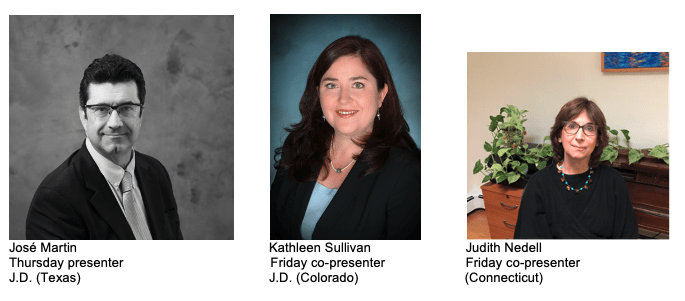 Perry Zirkel, Ph.D., J.D., L.L.M. (Pennsylvania)
Perry Zirkel, Ph.D., J.D., L.L.M. (Pennsylvania)
A Legal Snapshot of COVID-19 Issues for Public Schools, with the Primary Focus on Special Education and National Case Law Update
This session will provide a one-year update of the legal activity under the IDEA against the backdrop of claims under Section 504 and various other legal bases, arising from the COVID-19 pandemic. The IDEA legal activity includes not only hearing/review officer and court decisions but also both SEA and OCR complaint investigation decisions. The other legal claims extend to parent and teacher suits under the federal and state constitutions. The IDEA focus consists of an analysis of the frequency and outcomes of the major claims, such as the adjudicative issues of stay-put and exhaustion; the implementation and other dimensions of FAPE; and the calculation and implementation of compensatory education, including the role of the federal guidance for “compensatory services.”
 Laurie VanderPloeg Headlines the Keynote Lecture
Laurie VanderPloeg Headlines the Keynote Lecture
Laurie VanderPloeg returns to the virtual symposium as its 2022 keynote speaker on Sunday, June 19 at 7 PM. She is the Associate Executive Director for Professional Affairs, Council for Exceptional Children (CEC). Prior to joining CEC, she was the director of the Office of Special Education Programs (OSEP), in the Office of Special Education and Rehabilitative Services (OSERS), at the U.S. Department of Education. Laurie also served as director of special education at Kent Intermediate School District (Kent ISD) in Michigan. Also at Kent ISD, she served as assistant director for monitoring, compliance and parent support. She also served as a local supervisor of special education, a special education teacher, and an adjunct professor at Grand Valley State University in the special education administration program. Laurie is a graduate of Grand Valley State University. She is a parent of an adult son with disabilities.
Drawing upon her wide-ranging experiences in special education, including her stint as OSEP Director, Ms. VanderPloeg will share her insights of key current legal issues and trends under the IDEA and what seem to be the emerging directions of this law as we close in on its 50th anniversary.
The keynote session includes time for Q & A. As a registrant, this is your opportunity to address a national leader in special education policy development and implementation.
Registration for the keynote session is included in full-week registrations. “Per day” or Section 504 Institute registrants may add on the keynote session by contacting Shannon Weber at specialedlaw@lehigh.edu or by phone at (610) 758-5557.
Section 504 Coordinators Institute
The symposium offers an overlapping, but separable two-day (June 23-24) education component for school district Section 504 coordinators and others interested or involved in the Section 504 mandate for school districts. Registrants for the Section 504 component have the option to register also for one or more of the previous days in the Symposium.

Section 504 Topics:
- Recent Intersections of 504/ADA with the IDEA in Court and at OCR: The Legal Dance Waltzes On (Jose Martin) NEW
- Systematically Comparing Section 504 and the ADA with the IDEA: What Are the Significant and Also Subtle Differences? (Dr. Perry Zirkel) NEW
- Section 504: Understanding the Fundamentals (Jose Martin)
- Section 504: Practical Solutions to Key Questions (Kathleen Sullivan and Judith Nedell) NEW
Special Education Law Symposium
Following the Sunday evening keynote session, the week-long Symposium continues on Monday (June 20).
Eight, all new, litigation “hot topics” (three hours each) are offered Monday through Thursday to registrants who choose the Legally Experienced section.
For those registrants new to special education law, the Legally Basic section offers foundation knowledge in three-hour sessions: IDEA overview/legal terminology, child find/eligibility, free appropriate public education (FAPE), least restrictive environment (LRE), discipline, remedies, Pennsylvania regulations, and Section 504.
Legally Experienced “Hot Topics” NEW
 Amy Brooks, J.D. (Pennsylvania)
Amy Brooks, J.D. (Pennsylvania)
Legally Experienced “Hot Topics” Descriptors
- You Be the Judge: Dueling Attorneys (Andrew Faust, Jennifer Laviano and Ian Spechler)
- Navigating Compensatory Services and Compensatory Education in the Wake of the Pandemic (Mandy Favaloro)
- Know Your End Game: Strategic X’s and O’s for Special Education Settlements (Amy Brooks)*
- Dyslexia Legislation and Litigation: A Practical Overview of the Wide Range of Current State Laws and Cumulative Judicial Rulings (Catherine Michael)
- Liability for Abuse of Students with Disabilities: Money Damages as a Remedy in Federal Litigation (Rachel Hitch)
- Stay Put Right Where You Are!: The Many Permutations of Pendency under IDEA (Eileen Hagerty)
- Systematic Comparison of Section 504 and the ADA with the IDEA: What Are the Significant and Also Subtle Differences? (Dr. Perry Zirkel)
- Recent Intersections of 504/ADA with the IDEA in Court and at OCR: The Legal Dance Waltzes On (José Martin)
* Attorney Brooks’ reactor will be Pennsylvania parent attorney Heidi Goldsmith.
Ethical Challenges for Special Education Attorneys (attorneys only) NEW

This special option for attorneys (only) will be held on Wednesday, June 22 from 4:30 – 6:00 PM EDT for a small additional fee ($20).
The practice of special education law poses daunting ethical challenges for attorneys representing school families and districts. From the IEP-development process through the trial and settlement of disputes over classification, program, placement, and discipline, attorneys on both sides of the aisle have overarching professional responsibilities that may, at times, collide with their instinctive loyalty to their clients.
Who is the true “client” when attorneys are representing school districts or families? What is the obligation of a school attorney who uncovers disproportionate discipline practices toward students with emotional disabilities in the name of “school safety”? What are the ethical obligations of family-side attorneys when the parents are at impasse on a course of action, or the student is approaching her 18th birthday?
This session will cover these and a broad range of ethical issues for special education attorneys, including duties of candor and fairness to adversaries, witnesses and tribunals; and emerging ethical requirements regarding diversity, inclusion and elimination of bias, and more!
